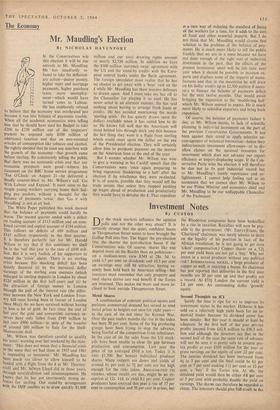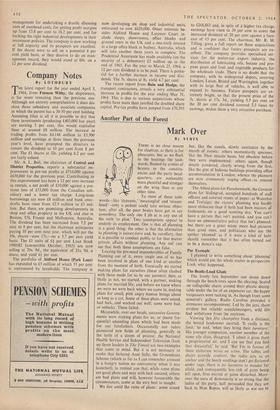Investment Notes
By CUSTOS
Do the stock markets influence the opinion polls and not the other way about? It is certainly strange that the quiet, confident boom in Throgmorton Street seems to have brought the Gallup Poll into line. The bigger the pre-election rise, the shorter the post-election boom if the Conservatives win. Of course; shares like EMI depend more on the Beatles than on politicians— on a medium-term view EMI at 28s. 3d. to yield 4.5 per cent on dividends and 10.5 per cent on earnings may still be attractive, having re- cently been held back by American selling—but investors must remember that only property and steel shares derive any real benefit if the Tories are returned. This makes me more and more in- clined to look outside Throgmorton Street. Do the stock markets influence the opinion polls and not the other way about? It is certainly strange that the quiet, confident boom in Throgmorton Street seems to have brought the Gallup Poll into line. The bigger the pre-election rise, the shorter the post-election boom if the Conservatives win. Of course; shares like EMI depend more on the Beatles than on politicians— on a medium-term view EMI at 28s. 3d. to yield 4.5 per cent on dividends and 10.5 per cent on earnings may still be attractive, having re- cently been held back by American selling—but investors must remember that only property and steel shares derive any real benefit if the Tories are returned. This makes me more and more in- clined to look outside Throgmorton Street.
Metal Shares
A combination of constant political upsets and peristent commercial demand has served to send metal prices to heights not seen for eight years— in the case of tin not since the Korean War. Over the past twelve months the rise in the index has been 50 per cent. Some of the big producing groups have been trying to stop the advance, being fearful of the competition from substitutes. in the case of tin the sales from the US stock- pile have been unable to close the gap between production and consumption. Last year the price of tin averaged £910 a ton. Today it is over £1,500. But beware individual producer shares. Many outputs are down and yields of around 61 per cent to 71 per cent, are not high enough for the risks taken. AMALGAMATED TIN NIGERIA, whose results, are due, might be an ex- ception at 12s. I Id. to yield 8.1 per cent. Copper producers have enjoyed this year a rise of 17 per cent in consumption and 50 per cent in prices, but the Rhodesian companies have been bedevilled by a rise in taxation. Royalties will now be pay- able to the government. (Mr. Emrys-Evans, the `Chartered' chairman, was surely unwise to insist on the legality of his 'position in face of the African revolution; he is not going to get even `token' compensation.) Copper shares on a, 121 per cent yield basis are not yet a `buy.' Why not invest in a metal producer without any political risk? INTERNATIONAL NICKEL, a large producer of copper as well, is enjoying a boom. Its chairman has just reported that deliveries in the first nine months are 20 per cent up and that profits are a record. At £331 London the current yield is 2.6 per cent. An outstanding dollar `growth' equity.
Second Thoughts on ICI Surely the time is ripe for la to improve its investment status in the market. Hitherto it has sold on a relatively high yield basis for an in- dustrial leader because its dividend cover has been slender. But this year it should at least be adequate. In the first half of the year pre-tax profits jumped from £42.8 million to £56.3 mil- lion and although the directors say that in the second half of the year the same rate of advance will not be seen it is pretty safe to assume pre- tax profits at over £105 million for the year or gross earnings on the equity of over 22 per cent.
The to dividend has been increased from 4. to 5 per cent and the final could be 6f per cent or 7 per cent making 111 per cent or 12 per cent, a `buy' if the Tories win. At 48s. the dividend yield would then be either 48 per cent or 5 per cent with probably double the yield on earnings. The shares can therefore be regarded as cheap. The investors should give full credit to the
management for undertaking a drastic slimming cure of overhead costs, for getting profit margins up from 13.8 per cent to 16.2 per cent, and for backing the right industrial developments in their investment policies. The company is now working at full capacity and its prospects are excellent. If the shares were to sell on a potential 4 per cent yield basis, as they deserve to do on man- agement record, they would stand at 60s. on a 12 per cent dividend.















































 Previous page
Previous page